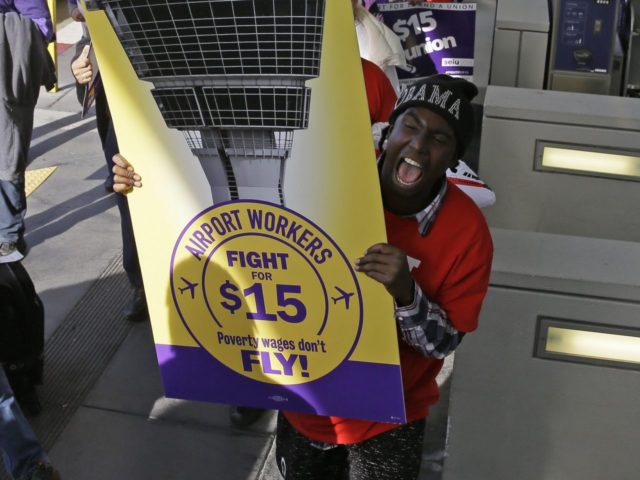San Francisco became the first California city to implement a $15 minimum wage ordinance for all businesses on July 1.
The union-backed “Fight for $15” claimed Seattle as the first city to pass a $15 minimum wage ordinance in June 2014. The movement created a groundswell, and 17 percent of Americans will live in a metropolitan area or a state with a $15 minimum wage by 2023, including the State of California.
Bay Area Labor Council union leaders, elected officials, and social justice activists that worked to pass Proposition J in 2014 with the support of 77 percent of voters celebrated in a Friday afternoon rally at City Hall. There were lots of speeches claiming that the “Fight for $15’”movement has economically and socially benefited 142,000 workers.
Assemblyman Phil Ting (D-San Francisco), who co-sponsored the California legislature’s $15 statewide minimum wage bill in 2016, trumpeted San Francisco’s $15 minimum wage for all businesses as an “amazing victory.” But Ting and the union leadership challenged the SF County Board of Supervisors to end poverty by passing a “Living Wage” that was estimated to be $23.79 an hour, according to the San Francisco Examiner.
The unions and Living Wage advocates claim that higher labor costs will just come out of business profits, rather than jobs. But that contradicts a Washington University economics study sponsored by the National Bureau of Economic Research (NBER) that analyzed the employment impacts for each $1 per hour phased in annual step increases for Seattle’s $15 minimum wage ordinance.
The NBER analysis demonstrated that raising the minimum wage to $13 an hour in 2016 reduced hours worked in low-wage jobs by 6-7 percent, while hourly wages in such jobs increased by 3 percent. As a result, total payroll for such jobs decreased, costing workers in low-wage jobs an average of $74 per month per job.
The liberal Washington Post reported a Harvard Business School study regarding the “The Impact of the Minimum Wage on Firm Exit” in the restaurant industry around the San Francisco Bay Area had reached different conclusions. The research revealed that there was no negative survival impact from minimum wage increases regarding Yelp 5 star-rated restaurants.
Social justice advocates like to claim that the study provides conclusive evidence that there are no business sustainability impacts for cities and states that pass $15 minimum wage laws. But the study’s major conclusion is that for the less elite restaurants rated at 3.5 stars, “a one dollar increase in the minimum wage leads to a 14 percent increase in the likelihood of exit.”
The best evidence for the impact of the $15 minimum wage may be the ongoing exodus of restaurants in San Francisco, whose workers often earn the minimum wage.

COMMENTS
Please let us know if you're having issues with commenting.